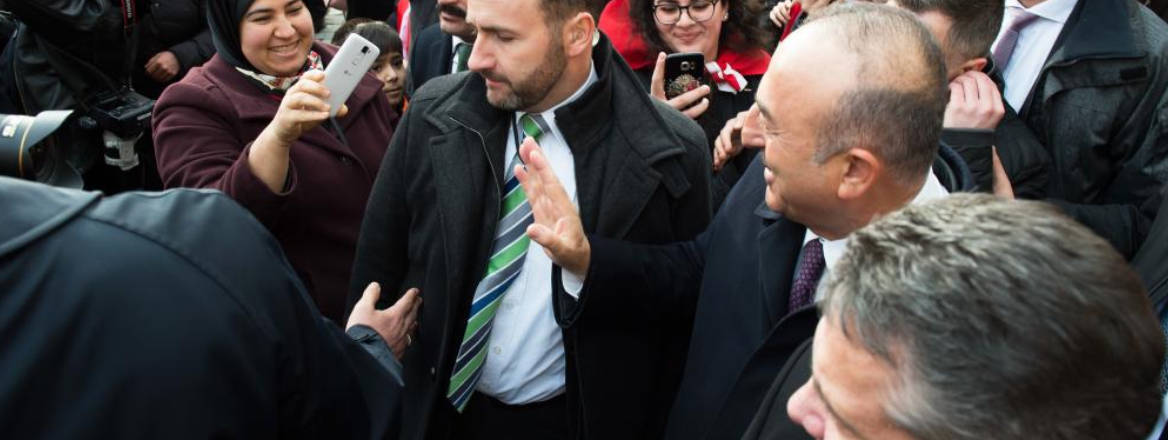Berlin and Ankara are looking to tone down the rhetoric of their disputes. However, the bilateral relationship, the most important one Turkey has with any European country, is likely to remain troublesome.
Germany still does not have a new government. More than 100 days after September’s parliamentary elections, Chancellor Angela Merkel this week started talks with the Social Democratic Party (SPD) to revive the Grand Coalition that has governed Germany for eight of the past twelve years.
Meanwhile, the old cabinet has continued to govern on a caretaker basis. Few of the acting-ministers have been as busy as Foreign Minister Sigmar Gabriel, who may well retain his post if there is another Grand Coalition. Topping his agenda is the ongoing and deepening crisis in German–Turkish relations.
Last Saturday, Gabriel hosted his Turkish counterpart Mevlut Cavusoglu in Goslar for a second round of informal talks (Gabriel also visited Antalya in November) to find a way to de-escalate the tensions between the two countries.
While both ministers stressed the need for dialogue, the bilateral relationship remains riddled with divisions and disagreements that are unlikely to be overcome soon
The talks appear to have been at least partially successful. Gabriel and Cavusoglu agreed to resume the strategic dialogue between their ministries and to encourage their governments to revive the suspended German–Turkish Economic Commission.
But, while both ministers stressed the need for dialogue, the bilateral relationship remains riddled with divisions and disagreements that are unlikely to be overcome soon. In Germany, many politicians and much of the mainstream media, as well as public opinion remains sharply critical of Turkey and especially President Recep Tayyip Erdogan, who is widely seen as becoming ever more authoritarian.
The crisis has been building steadily over the past two years. Ankara was disappointed with Germany’s understated condemnation of the July 2016 coup attempt against Erdogan.
Ankara has since reacted indignantly to any criticism from Berlin of its crackdown against the Gulen Movement, Kurdish and other opposition groups and large segments of the country’s independent media.
Ahead of Turkey’s constitutional referendum in April 2017, Berlin refused to permit Turkish politicians to campaign in Germany (about 1.4 million Turkish voters live in Germany), prompting an angry Erdogan to accuse Merkel and her government of ‘Nazi methods’. His remarks led to an understandable outcry across the German media landscape.
During the German election campaign politicians sought to outdo each other in criticising Erdogan’s increasingly authoritarian style of government. In return, Erdogan declared all major German parties ‘enemies’ of Turkey.
Aside from escalating its rhetoric towards Ankara, Berlin has sought to bring to bear some of its substantial economic leverage
For the German public, the rift in the relationship with Turkey is personified in the cases of several German (or dual German–Turkish) citizens arrested in Turkey for what Berlin considers political charges.
The most prominent case is that of journalist Deniz Yucel, the Turkey correspondent for the German daily Die Welt, who was detained in Istanbul in February 2017. The Turkish government has accused Yucel of espionage, spreading terror propaganda and inciting violence, but is yet to bring official charges.
While many of the other German detainees have been released in recent months, Yucel, who spent much of the past year in solitary confinement and was repeatedly denied consular visits, remains incarcerated.
Aside from escalating its rhetoric towards Ankara, Berlin has sought to bring to bear some of its substantial economic leverage resulting from it being Turkey’s most important trading partner.
This has included, for example, restricting permissions for arms exports to Turkey, which has delayed a planned joint venture to build a new Turkish battle tank involving German defence company Rheinmetall. In total, German exports to Turkey were down by 5.9% over the first nine months of 2017, the latest period for which official figures are available.
Most importantly, Germany has played a decisive role in halting talks between the EU and Turkey over upgrading the joint customs union. This measure is particularly painful for Turkey.
The customs union, in place since 1996, has been a key factor in Turkey’s economic rise over the past two decades. Ankara now wants to widen it to include services and agricultural products, which, as a study by the Munich-based Ifo Institute suggests, could add up to 1.8% to Turkey’s GDP.
The desire to get the customs union negotiations back on track is likely the key driving force behind the recent charm offensive by the Turkish government, which has included Erdogan’s visit earlier this month to Paris. How successful it will be, however, is unclear. In Paris, Erdogan got into a spat with a journalist; and Cavusoglu’s meeting with Gabriel has been met with mixed reactions in Germany.
The German–Turkish relationship is far from an ordinary one, and that Berlin has clear interests in repairing ties with Ankara
Cem Ozdemir, co-chair of Germany’s Green Party and a particularly vocal critic of Ankara, has warned the government not to fall for a change in Turkish rhetoric while the facts on the ground remain effectively the same.
He accused Erdogan of trying to use Yucel as a ‘personal hostage’ to be eventually exchanged for an economic deal – a practice that would be highly unseemly especially among long-time allies.
This is the crux of the matter for Gabriel and the German government. The German–Turkish relationship is far from an ordinary one, and that Berlin has clear interests in repairing ties with Ankara. Aside from the lucrative bilateral economic relationship and other strategic issues, Germany also wants continued Turkish help with managing the refugee crisis in the eastern Mediterranean.
At the same time, Berlin cannot be seen to be giving in to Turkish bullying and set a precedent in which it exchanges political and economic favours for the release of unlawfully incarcerated German citizens (as the German government insists is the case with Yucel and other detained Germans).
Resolving the Yucel case without tying it to German concessions is therefore crucial. But even if a solution is found, German–Turkish relations are unlikely to return to their pre-crisis state.
Instead, they are more likely to take on a much cooler, transactional tone that will limit opportunities for both countries. A long-term improvement and restoration of mutual trust, at least from the German side, is possible only if Ankara changes course domestically and becomes less confrontational on the international stage.
WRITTEN BY
Dr Tobias Borck
RUSI Senior Associate Fellow, International Security


